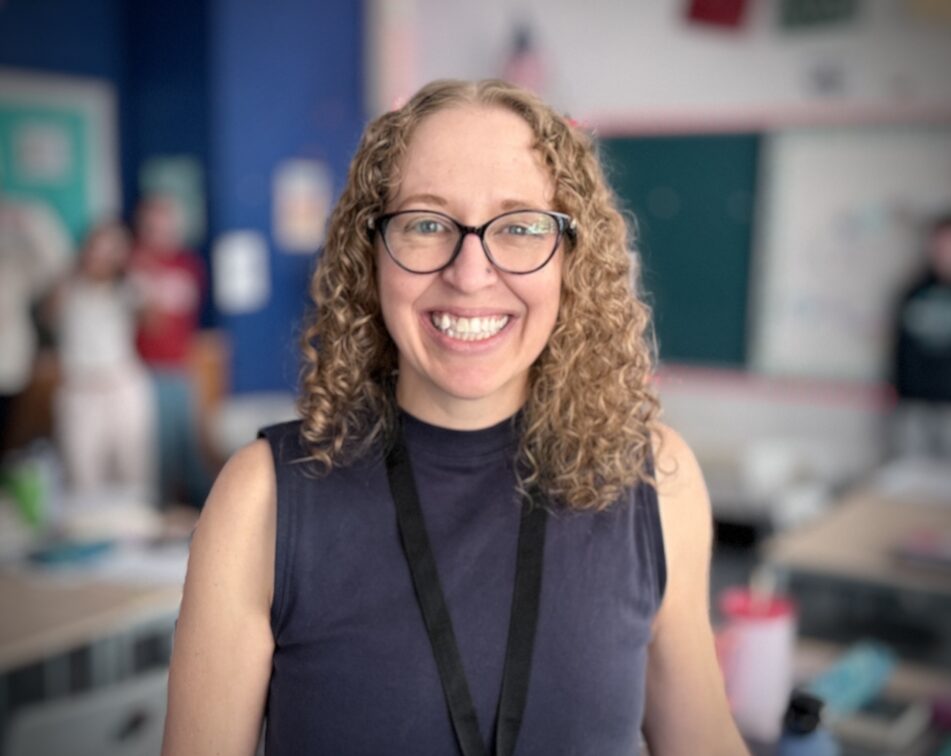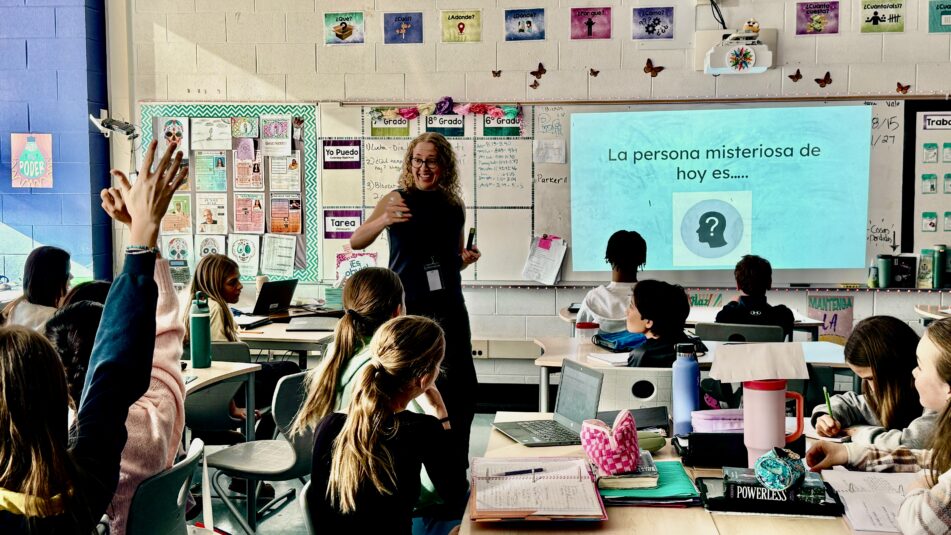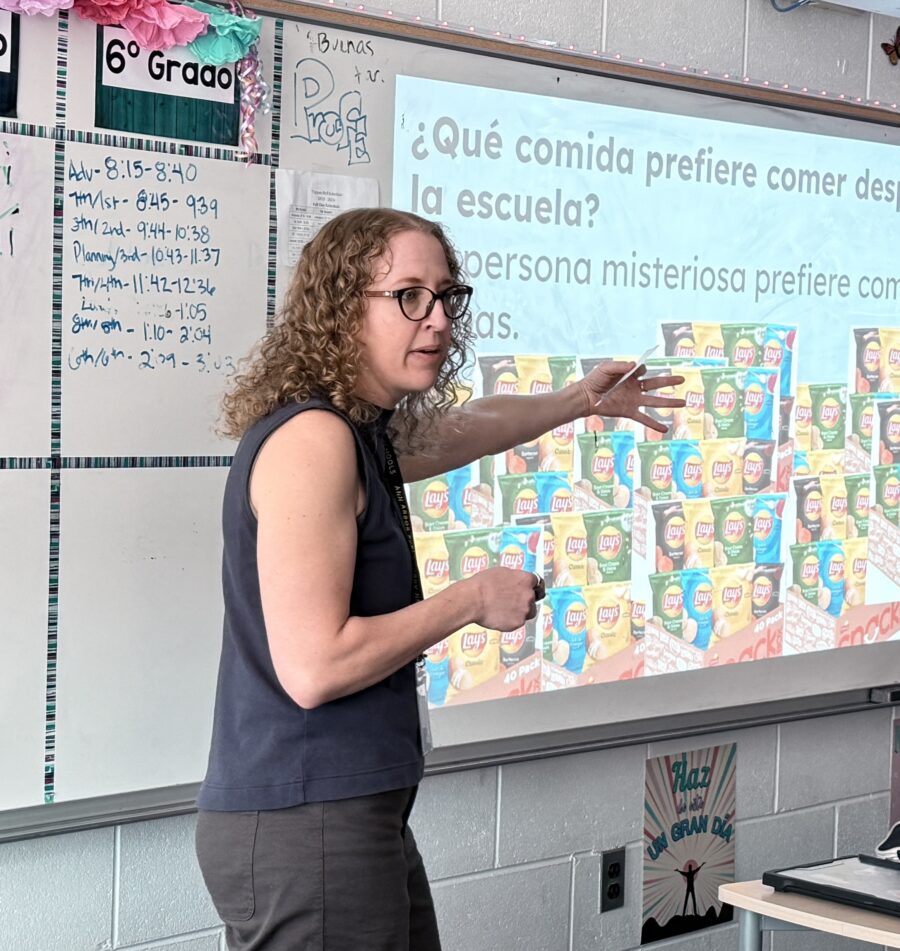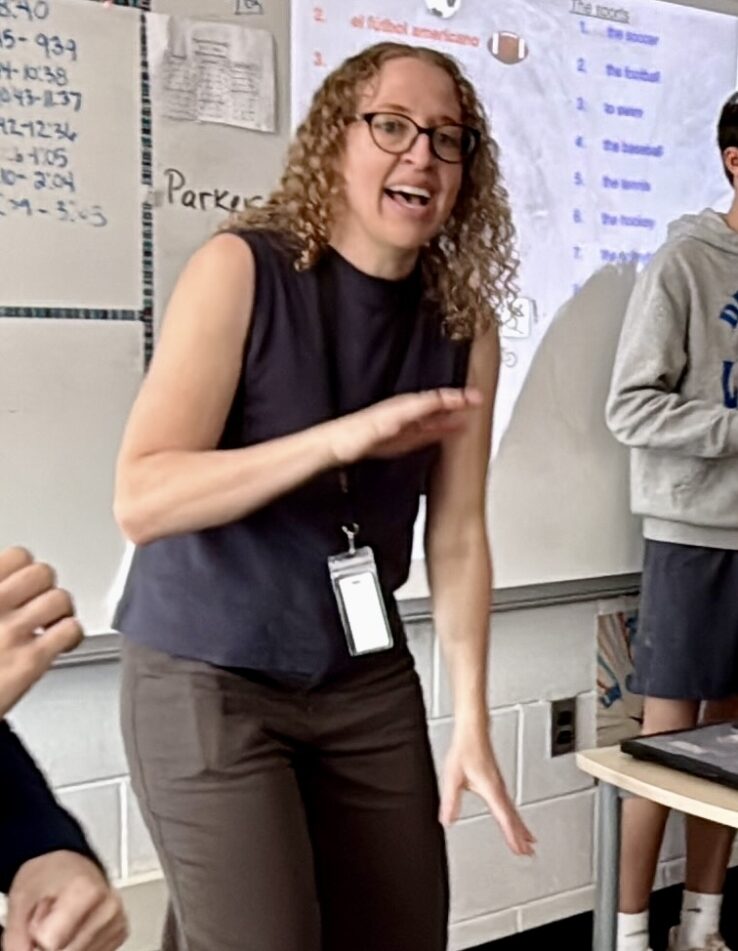Erica Peplinski-Burge wins the Barbara Ort-Smith Award for her leadership and unwavering commitment to excellence in world language education.

Editor’s Note: At the recent MiWLA Annual Conference in Lansing, two outstanding AAPS language educators were recognized. Erica Peplinski-Burge, Spanish teacher at Tappan, received the Barbara Ort-Smith Award—the field’s most prestigious honor—for her leadership and commitment to excellence. Danielle Capitan, German teacher at Pioneer and Huron High Schools, received the Distinguished Service Award for her exemplary service to MiWLA and advocacy for language learning. She was honored as an AAPS Exceptional Teacher in 2021, when she taught at Tappan Middle School.



By Jo Mathis/AAPS District News
When one of Erica Peplinski-Burge’s shy elementary students brought the class’s stuffed animal mascot to a local Mexican restaurant years ago, the server recognized the “Spanish pet” from the school project and invited the girl into the kitchen to speak Spanish with the staff.
That quiet, reserved student returned to class confident, beaming, eager to share her experience.
For Erica Peplinski-Burge, who now teaches Spanish at Tappan Middle School, these moments of connection are what world language education is all about. Her dedication to creating such transformative experiences recently earned her recognition at the Michigan World Language Association Annual Conference in Lansing, where she received the Barbara Ort-Smith Award, the most prestigious honor in the field of world language education.
“During my career, I have taught multiple subjects, including science, Spanish, and elementary education,” says Peplinski-Burge, “but I found my true home when I started teaching Spanish.”
“All human beings share certain needs: food, shelter, air, and community. But if we all ate the same food, cheered for the same teams, and celebrated the same holidays, the world would be a dull place without creativity or innovation. What makes the world fascinating are the differences, the unique ways people live, speak, and express themselves.”
This perspective shapes everything in her classroom.
“I love exploring both what connects us and what makes us unique with my students,” she says. “Through world language learning, we build understanding, curiosity, and empathy while also strengthening our brains.”
Building Community Through Language
Peplinski-Burge’s approach begins with creating a strong foundation within the classroom walls before expanding students’ horizons to the wider world.
“Students are always at the center of my curriculum,” she says. “We begin by building community within our own classroom through personalized questions, storytelling, and music. Once students feel connected to each other, we extend that curiosity outward to the wider world using those same approaches.”
One of her signature activities exemplifies this student-centered approach. A favorite activity is Persona Misteriosa, a variation of the popular Persona Especial interviews. Students fill out slides with information about themselves, and she shares the slides anonymously with the class. The students then read and listen in Spanish to guess who the ‘mystery person’ is.
“There is so much buy-in, laughter, and excitement,” she says. “It gives every student a chance to be seen and celebrated while using the language in meaningful, real ways.”
Her class includes activities designed to make Spanish a living part of students’ lives. Her students read stories, learn about musicians, complete music brackets, and even watch shows, all in the target language.
“The result is a joyful, communicative classroom where Spanish becomes a tool for genuine connection, not just a subject to memorize,” she says.
The Human Element in a Digital Age
In an era of increasing technological capability, including sophisticated translation tools, Peplinski-Burge makes a case for the value of human language learning.
“Humans are wired to connect,” she says. “In today’s world, where we are more attached to screens than ever, what we need most is genuine human connection. That is exactly what world language education provides.”
She sees language teachers as facilitators of something much deeper than vocabulary and grammar, noting that they teach communication, empathy, and understanding through the shared experience of language and culture. We help students listen deeply, communicate thoughtfully, and engage face-to-face. No computer translator can replace the warmth and nuance of a real conversation.”
Leading Beyond the Classroom
The Barbara Ort-Smith Award recognizes not only her excellence in the classroom but also her leadership in elevating the entire field of world language education.
Peplinski-Burge’s commitment to world language education extends beyond her own students at Tappan. Passionate about helping grow and support the language-teaching community, she has presented at conferences across the country, helped create a language conference here in Michigan called MittenCI, collaborated on various nationally used curricula, and written a Spanish graphic novel for language learners.
“Sharing ideas and collaborating with other educators is one of the most rewarding parts of my career,” she says.
For advocates of world language programs facing uncertain support, Peplinski-Burge offers clear guidance.
“To strengthen our programs, we need to help others see the deep value of connection, of being able to understand and be understood by another person,” she says. “That skill will always matter, no matter how technology advances.”
Peplinski-Burge taught for 14 years in Saline, and then four in Ann Arbor, before she took a break from teaching to work in World Language Curriculum, helping design curriculum and publish novels for three years for Voces Digital and Teacher’s Discovery. She started back at Tappan just a few weeks ago.
“I wasn’t planning to come back to the classroom, as I enjoyed my other job,” she says, “but I couldn’t resist when I saw the Spanish position open at Tappan, so here I am!”
She says she loves being back in the classroom.
“Creating curriculum is fun, but I missed doing the activities with students,” she says. “The students are what make teaching joyful.”


Be the first to comment